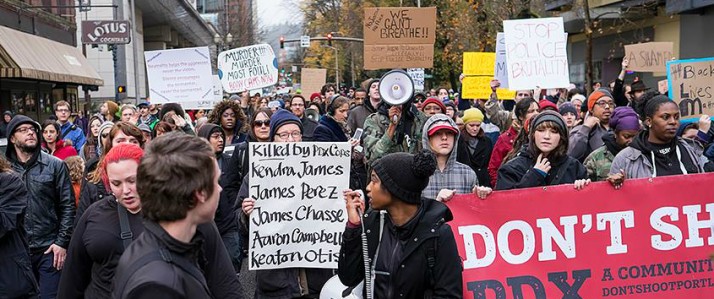“This struggle may be a moral one, or it may be a physical one, and it may be both moral and physical, but it must be a struggle. Power concedes nothing without a demand. It never did and it never will.” – Frederick Douglass, 1857
I was recently struck by a piece in the Washington Post by Barbara Reynolds, an ordained minister and former USA Today editor and columnist. Reynolds wrote that she finds it ‘hard to get behind today’s Black Lives Matter movement.’
She waxes nostalgic about the methods and intentions of leaders of the past civil rights era and draws a contrast with Black Lives Matter movement leaders and activists, finding them too confrontational, too disruptive, and too inclined toward sagging pants and boorish language.
In different circumstances, I might dismiss Reynolds as one voice, yearning for a time of decorum – even in the face of sanctioned beatings and police dog attacks – and showing her age and distance from the modern, youthful energy of today’s Black liberation movements.
But Reynolds is not alone.
I’ve heard the same critiques come from supporters of Democratic candidates that have faced protests by Black Lives Matter Activists. In one piece, Atlantic columnist Conor Friedersdorf listed all of the ways he sees the Black Lives Matter movement scaring their friends away, concluding that the Black Lives Matter activists need to organize “in a manner more likely to increase the odds that a coalition from across the ideological spectrum” will support their issues. Another columnist talking about Black Lives Matter protest tactics argued simply, “It’s stupid, don’t do it.”
What’s happening here is dangerously familiar to me. These authors list a litany of reasons to justify their hesitations to fully support Black Lives Matter activists, to justify claims of “I support Black lives, but….” Familiar because I’m reminded that whenever an oppressed group pushes beyond the boundaries imposed on it by outside forces, when we make too much noise, when we get a little too in-your-face, when we exercise our agency to determine the destiny of our communities – there is always pushback.
And – as has been demonstrated in recent months by pundits, right wingers, politicians of all ilks– this rising up, this new Black movement-building, has always been met by strong societal censure that attempts to silence activists, gain distance from them, force them back to the way things were, shame or harm them more.
This has been true movement after movement. LGBTQ folks being told they need to fit in, women being told to not be so aggressive and, now, young, Black organizers being told they need to not be so loud. This attack on tactics – especially from those we’d think would be our friends – is all too common when attacks based on issues fall flat.
New tactics for a new era.
This new version of the continued movement for Black liberation holds the same intense need for justice. They are fighting for many of the same things: the right to freedom from being murdered in cold blood by anyone who hides behind a law enforcement badge and uniform; the right to peaceful assembly without one’s activities being assumed to be gang-affiliated or criminally-informed; the right to travel on local streets and highways without the threat of being stopped, intimidated, profiled, or murdered.
But they are choosing different tactics for a different time.
So, what if, instead of quibbling over tactics or questioning strategies, we offered our full support to the leadership and energy of the young, Black organizers at the forefront of this movement?
What if we stop trying to tell those who are putting their bodies on the line, what methods are best?
What if we simply trusted the leadership of those most impacted by injustice?
Today’s young activists and movement leaders were raised in a time of digital access to all the news out there; raised with access to more information in a millisecond than my generation saw over 10 years. They are acutely – and immediately – aware of ‘in real time’ killings in broad daylight of unarmed Black men, boys, women, and trans* folks. They have access to organizing tools and platforms that the civil rights movements of decades past couldn’t dream of.
It is their generation that will have to deal with the long-term consequences of unchecked police brutality and record-level incarceration rates. And they understand that, in order to change that, they will have to struggle, have to demand a better, more just future.
So, no, as rapper Tef Poe pointed out, this is not your grandmother’s civil rights movement. It is a new movement, invigorated by the energy of a young, diverse, and committed group of Black organizers. It is being led by those who are most impacted in a way that best aligns with their community, their needs, their vision. And I wouldn’t have it any other way.






Sharon,
I appreciate you saying that the young will, and ought to, organize their way — and if it makes those of us who are forty and fifty and sixty years older uncomfortable, Oh Well. (You didn’t say that, but I am.)
Helping young activists brush such criticisms aside strikes me as a better use of our years. Thank you for doing so here. Every social movement comes with Monday morning quarterbacks: Nobody has ever done anything worth doing to universal approval.
Thank you, Nan, for your clever and thoughtful response. Yes, I agree that it is necessary to appreciate the right of the young to organize their way, to decide their tactics, and to make others – particularly those from a different era – uncomfortable. I’ve found that’s the way things change. I’m tickled that you suggest that possible discomfort is okay, too. Thanks for your candor and commitment to real change by the young – which we all were at one time. I hope you’ll keep reading and responding.
Sharon,
I don’t have negative thoughts about demonstrations. They are one of the necessary tools in the social justice toolkit. I was probably in every march and rally in Portland between 1975 and a few years ago when we all knelt down on the bridge and I had trouble getting up. I don’t have any trouble with loud, vocal, intense, angry, creatively responsive to the situation words or songs. Tactics are usually where people who can agree on the goal, fall out and begin to see one another as “dumb”, buguie or in the words of the sixties, simply “not Black enough”. Tactics should be the last thing considered when developing a plan to make change and should be tied to what ever goals have been established for the action. I do think that people get to develop their own plans and therefor their own tactics. My critique of those tactics are frequently based on MY goals, not necessarily the goals of the person/movement I am critiquing and so my critique may be completely invalid. I support the young people…. but…. I know that I can help some of the tactical efforts to be effective in some areas, simply because I have done those things before. So while I support the passion, leadership and involvement of Black youth (and I am able to do that without seeing a full blown plan for the future), I believe that how they treat others including me and one another in their efforts is a reflection of the world they want to build. You may call it respectability politics but I call it “you don’t need to talk like that” behavior. In the 60’s, I liked being called “sister” and calling the men “brother”, some of us still do that as a reflection of the world we want to see. I liken it to working with you Sharon, who I honor, respect, love and adore ..but…. if I think I see something wrong, I get to tell you. Being behind the Black Lives Matter movement does not mean that I don’t get to say what I think. I am glad the young people are there working in ways we could not have imagined in 1967. Mo Power to them!
Thanks so much, Kathleen Saadat, for your thoughtful consideration of today’s movement for Black lives. I agree that demonstration tactics, leadership and participants can differ greatly across time, and issues. I also agree that there is a way to disagree and to also accept critique without hearing it as criticism; to learn and to lead simultaneously, no matter our age. You’re correct; there’s so much today’s leaders could learn from those who came before, so much to pass on to support young Black leadership on the frontlines challenging the dangerous assaults on our dignity, character and our lives. I’m exited to imagine all of us in conversation and coming together around shared issues, goals and outcomes. You’ve repeatedly shown you are willing to step up, speak out, support leadership, and challenge us to be better. I’m glad you’re on board for the long haul. Thanks again for food for thought.
I was struck by the whole “not your grandma’s movement.” But then I realized that the black panthers were pretty direct. Deacons for defense went way past anything the panther or BLM have done thus far. And that there are many stories untold or invisibiliEd because much of the year old history of the civil rights movement highlights the respectability politics aspects of them. But Fannie Lou wasn’t about respectability. Not Ella baker either. So the. It dawned on me that yeah, this is exactly like my grandma’s movement, it’s just her story was never retold. Which makes we want to make sure that this story is not respectability-washed in the present or future.
I can certainly agree with you, Ludovic that the Panthers were very direct in mission and purpose, as their community safe keeping demonstrated. They didn’t ask for nor need others permission or versions of respectability. They marched up to their detractors to do their work. From Fannie Lou, Ella, Harriet, to Sojourner “telling” Truth, they are our grandmothers moving us forward, all rabble rousers and agitators for freedom. You’re correct, they named and protested the conditions of their times; out loud and unapologetic. If respectability has its place, it’s certainly not guaranteed to move those vehemently opposed to our quests for freedom and justice,as you so capably pointed out. Thanks for always being about freedom and justice work. It matters.